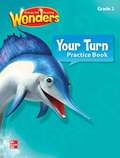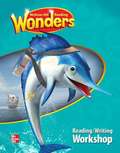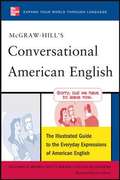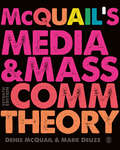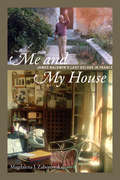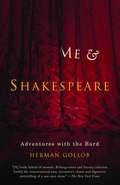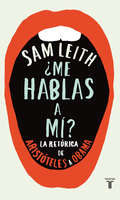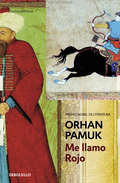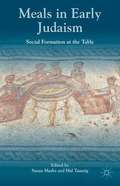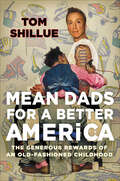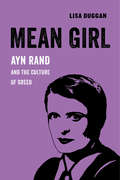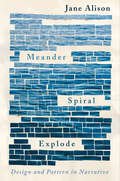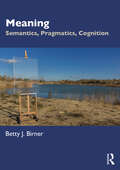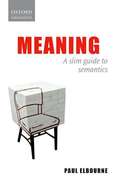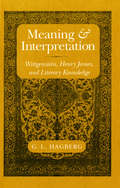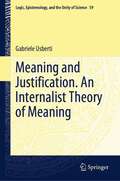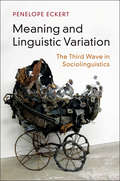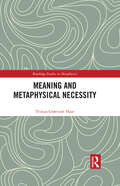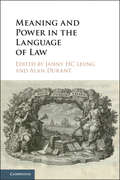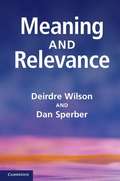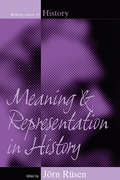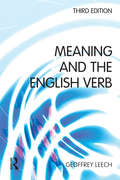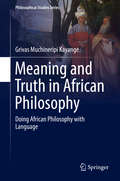- Table View
- List View
McGraw-Hill Reading Wonders Grade 2 Your Turn Practice Book
by The Editors at the The McGraw-Hill CompaniesWorkbook 2nd Grade
McGraw-Hill Reading Wonders Reading/Writing Workshop, Grade 2
by The Editors at McGraw Hill EducationMcgraw-hill Reading Wonders Reading/Writing Workshop, Grade 2.
McGraw-Hill's Conversational American English: The Illustrated Guide to the Everyday Expressions of American English
by Richard A. Spears Betty J. Birner Steven Racek Kleinedler Luc NissetAs a new speaker of English, you may hear some expressions in your daily conversations that you do not understand--yet. McGraw-Hill's Conversational American English will help you learn these expressions, so not only do you know what a person is saying to you, but that you can use the expression yourself! More than 3,000 expressions are organized by theme, so you can find what you are looking for quickly. And each topic is illustrated to further help you understand context. The book features: Common expressions are batched into 350 themes, ranging from general greetings and asking how someone is, to the more specific needs, like showing disbelief, asking someone's intentions, and expressions for a forgotten word or name A comprehensive thematic glossary provides an additional means for the learner to locate expressions by key words and concepts Topics include: Basic Social Encounters, Greetings, Small Talk, Introductions, Ending a Conversation, Good-Byes, Agreeing, Disagreeing Conversational Encounters, Focusing Attention, Launching the Conversation, Making Friends, Complex Matters, Disputes, Discussion and Resolution, Polite Encounters, Prefaces, Communication Barriers
McQuail’s Media and Mass Communication Theory
by Professor Denis McQuail Mark DeuzeNow in its seventh edition, this landmark text continues to define the field of media and mass communication research, offering a uniquely detailed, broad, and balanced guide. It maintains the narrative into the world of pervasive, ubiquitous, mobile, social and always-online media that we live in today. New to this edition: • Examples are now integrated within each chapter around politics and the public sphere, as popular culture and politics become more regularly intertwined. • An increased focus on conceptualizing &‘mass&’ media and communication and media theory in an age of big data, such as algorithmic culture, AI, platform economies, streaming, and mass self-communication. • Further discussion of what we want and expect of media and society in all chapters. • New and revised material, including a new chapter &“A Canon of Media Effects&”, bringing together Social-Cultural Effects & News, Public Opinion and Political Communication, helping the reader to rethink and reframe the whole idea of media effects and influence. A vitally important for all students of Media and Mass Communication in the 21st century.
McQuail’s Media and Mass Communication Theory
by Professor Denis McQuail Mark DeuzeNow in its seventh edition, this landmark text continues to define the field of media and mass communication research, offering a uniquely detailed, broad, and balanced guide. It maintains the narrative into the world of pervasive, ubiquitous, mobile, social and always-online media that we live in today. New to this edition: • Examples are now integrated within each chapter around politics and the public sphere, as popular culture and politics become more regularly intertwined. • An increased focus on conceptualizing &‘mass&’ media and communication and media theory in an age of big data, such as algorithmic culture, AI, platform economies, streaming, and mass self-communication. • Further discussion of what we want and expect of media and society in all chapters. • New and revised material, including a new chapter &“A Canon of Media Effects&”, bringing together Social-Cultural Effects & News, Public Opinion and Political Communication, helping the reader to rethink and reframe the whole idea of media effects and influence. A vitally important for all students of Media and Mass Communication in the 21st century.
Me and My House: James Baldwin's Last Decade in France
by Magdalena J. ZaborowskaThe last sixteen years of James Baldwin's life (1971–87) unfolded in a village in the South of France, in a sprawling house nicknamed “Chez Baldwin.” In Me and My House Magdalena J. Zaborowska employs Baldwin’s home space as a lens through which to expand his biography and explore the politics and poetics of blackness, queerness, and domesticity in his complex and underappreciated later works. Zaborowska shows how the themes of dwelling and black queer male sexuality in The Welcome Table, Just above My Head, and If Beale Street Could Talk directly stem from Chez Baldwin's influence on the writer. The house was partially torn down in 2014. Accessible, heavily illustrated, and drawing on interviews with Baldwin's friends and lovers, unpublished letters, and manuscripts, Me and My House offers new insights into Baldwin's life, writing, and relationships, making it essential reading for all students, scholars, and fans of Baldwin.
Me and Shakespeare: Adventures with the Bard
by Herman GollobIn this unique memoir, a legendary editor tells how, on the verge of retirement, he developed a passion for the works of Shakespeare and gained new perspectives on his own life.
¿Me hablas a mí?: La retórica desde Aristóteles hasta Obama
by Sam Leith¿Qué tiene la retórica para estar en todas partes? Una historia y una guía del arte de la persuasión. La retórica está por todas partes. Cuando se hace una presentación ante un cliente importante, cuando un entrenador habla con sus jugadores en el descanso del partido, cuando se intenta convencer a los niños de que se coman la verdura. Hace que los gobiernos triunfen o caigan, que los delincuentes sean condenados o liberados y que hombres adultos y sensatos marchen decididos hacia las ametralladoras. La retórica es lo que convence y engatusa, inspira y embauca, entusiasma y engaña. Y no es solo el territorio de los políticos. ¿Qué ha hecho la retórica por nosotros? Para empezar, ha creado prácticamente toda la civilización occidental. ¿Qué es la democracia sino la idea de que el arte de la persuasión debe ocupar formalmente el centro del proceso político? ¿Qué es la ley sino una forma de otorgar a las palabras fuerza formal en el mundo y qué es un tribunal sino un lugar en el que el arte de la persuasión configura la sociedad civil? Y, en una sociedad en la que una persona o grupo ejerce el poder sobre los demás -es decir, cualquier sociedad- ¿cuál es el instrumento de dicho poder sino las palabras? Sam Leith explora el arte de la persuasión desde sus orígenes en Grecia hasta su apoteosis en el siglo XXI. Relata las historias de sus villanos y sus héroes, desde Hitler hasta Cicerón, pasando por Martin Luther King, Homer Simpson, Obama, Jennifer Lopez o Nixon; explica los mecanismos de los grandes discursos; y, lo que es más importante, nos descubre que la retórica es útil, aplicable... y que no hay que tenerle ningún miedo. La crítica ha dicho:«Inmensamente entretenido. ¿Me hablas a mí? es un libro alegre, erudito y en ocasiones muy divertido acerca de la retórica, pero también es un agudo yexcepcional análisis de cómo funciona la política.»The Literary Review «Además de las anécdotas, Leith proporciona una inspiradora guía para usar la técnica. Este es un libro atractivo y apasionado.»The Sunday Times «Uno de los encantos de este libro es la soltura con la que Leith aborda sus contenidos, desde los más elevados a los más básicos. Maneja importantes textos antiguos que en bruto pueden ser irritantes con un toque deliciosamente ligero, sin sacrificar la seriedad ni la delicadeza.»The Guardian «Sam Leith revive la poderosa disciplina de la retórica clásica. Ya no es terreno de sofistas muertos. Ha vuelto a ser heroica.»London Evening Standard «Leith hace gala de un grado formidable de descaro intelectual. La retórica ya no es un tema arrinconado para gente pasada de moda. Determina cómo vivimos hoy.»The Scotsman «Leith da una relevancia actual a una antigua práctica. Pese a serriguroso en su análisis de la retórica en la historia, Leith no es en absoluto un pedagogo aburrido. Lea este entretenido e instructivo libro y nunca volverá a confundir occultatio con occupatio.»The Times
Me llamo rojo
by Orhan PamukEn el Estambul de finales del siglo XVI, el Sultán encarga secretamente un gran libro que celebre su vida y su imperio. Los encargados de iluminar esa obra son los mejores artistas del momento, pero... deberán hacerlo al modo europeo. Cuando uno de esos miniaturistas desaparece y nacen las sospechas de asesinato, el maestro del taller deberá buscar ayuda.
Meals in Early Judaism
by Susan Marks Hal TaussigThis is the first book about the meals of Early Judaism. As such it breaks important new ground in establishing the basis for understanding the centrality of meals in this pivotal period of Judaism and providing a framework of historical patterns and influences.
Mean Dads for a Better America: The Generous Rewards of an Old-Fashioned Childhood
by Tom ShillueAs a comedian and conservative thinker, whip-smart funny Tom Shillue grounds his ideas about our current culture and political climate in stories from his childhood — a portrait of growing up in 1970s America. Growing up as one of five kids in a devout Irish Catholic family in a small town outside of Boston, Tom sincerely believes that the rough-and-tumble, rules-dominated world in which he came of age was a better America—a time and place that made him into the well-adjusted, happy, successful man he is today. In Mean Dads for a Better America, Tom reminisces about his childhood, his family, and the traditional values he cherishes. He takes us back to a time when neighbors disciplined each other’s children without fear of being sued, when kids made it to the family table for dinner, when parents’ rules were gospel, when the occasional fistfight was considered a fair way to solve a problem, and when children were free to roam, make mistakes, and experience the first tastes of independence. Tom debates, debunks, and entertains with his hilarious approach to issues of the day, tackling the issues that confound many Americans, like our hypersensitive culture and overzealous parenting. As Tom celebrates the stability of family life and the sanity of days gone by, he encourages us to hold on to our sense of humor and look back at our own lives, as we work towards creating a better future for ourselves and our kids, all while making us laugh.
Mean Girl: Ayn Rand and the Culture of Greed (American Studies Now: Critical Histories of the Present #8)
by Lisa DugganAyn Rand’s complicated notoriety as popular writer, leader of a political and philosophical cult, reviled intellectual, and ostentatious public figure endured beyond her death in 1982. In the twenty-first century, she has been resurrected as a serious reference point for mainstream figures, especially those on the political right from Paul Ryan to Donald Trump. Mean Girlfollows Rand’s trail through the twentieth century from the Russian Revolution to the Cold War and traces her posthumous appeal and the influence of her novels via her cruel, surly, sexy heroes. Outlining the impact of Rand’s philosophy of selfishness, Mean Girlilluminates the Randian shape of our neoliberal, contemporary culture of greed and the dilemmas we face in our political present.
Meander, Spiral, Explode: Design and Pattern in Narrative
by Jane Alison"How lovely to discover a book on the craft of writing that is also fun to read . . . Alison asserts that the best stories follow patterns in nature, and by defining these new styles she offers writers the freedom to explore but with enough guidance to thrive." ―Maris Kreizman, VultureA Publishers Weekly Best Book of 2019 | A Poets & Writers Best Books for WritersAs Jane Alison writes in the introduction to her insightful and appealing book about the craft of writing: &“For centuries there&’s been one path through fiction we&’re most likely to travel― one we&’re actually told to follow―and that&’s the dramatic arc: a situation arises, grows tense, reaches a peak, subsides . . . But something that swells and tautens until climax, then collapses? Bit masculosexual, no? So many other patterns run through nature, tracing other deep motions in life. Why not draw on them, too?"W. G. Sebald&’s Emigrants was the first novel to show Alison how forward momentum can be created by way of pattern, rather than the traditional arc--or, in nature, wave. Other writers of nonlinear prose considered in her &“museum of specimens&” include Nicholson Baker, Anne Carson, Marguerite Duras, Gabriel García Márquez, Jamaica Kincaid, Clarice Lispector, Susan Minot, David Mitchell, Caryl Phillips, and Mary Robison.Meander, Spiral, Explode is a singular and brilliant elucidation of literary strategies that also brings high spirits and wit to its original conclusions. It is a liberating manifesto that says, Let&’s leave the outdated modes behind and, in thinking of new modes, bring feeling back to experimentation. It will appeal to serious readers and writers alike.
Meaning: Semantics, Pragmatics, Cognition
by Betty J. BirnerMeaning addresses the fundamental question of human language interaction: what it is to mean, and how we communicate our meanings to others. Experienced textbook writer and eminent researcher Betty J. Birner gives balanced coverage to semantics and pragmatics, emphasizing interactions between the two, and discusses other fields of language study such as syntax, neurology, philosophy of language, and artificial intelligence in terms of their interfaces with linguistic meaning. Comics and diagrams appear throughout to keep the reader engaged; and end-of-chapter quizzes, data-collection exercises, and opinion questions are employed along with more traditional exercises and discussion questions. In addition, the book features copious examples from real life and current events, along with boxes describing linguistic issues in the news and interesting and accessible research on topics like swearing, politics, and animal communication. Students will emerge ready for deeper study in semantics and pragmatics – and more importantly, with an understanding of how all of these fields serve the fundamental purpose of human language: the communication of meaning. Meaning is an ideal textbook for courses in linguistic meaning that focus on both semantics and pragmatics in equal parts, with special attention on philosophical questions, related subfields of linguistics, and interfaces among these various areas. Appropriate for both undergraduate and graduate-level courses in semantics, pragmatics, and general linguistics, Meaning is essential reading for all students of linguistic meaning.
Meaning: A Slim Guide To Semantics
by Paul ElbourneThis book offers an introduction to the analysis of meaning. Our outstanding ability to communicate is a distinguishing feature of our species. To communicate is to convey meaning, but what is meaning? How do words combine to give us the meanings of sentences? And what makes a statement ambiguous or nonsensical? These questions and many others are addressed in Paul Elbourne's fascinating guide. He opens by asking what kinds of things the meanings of words and sentences could be: are they, for example, abstract objects or psychological entities? He then looks at how we understand a sequence of words we have never heard before; he considers to what extent the meaning of a sentence can be derived from the words it contains and how to account for the meanings that can't be; and he examines the roles played by time, place, and the shared and unshared assumptions of speakers and hearers. He looks at how language interacts with thought and the intriguing question of whether what language we speak affects the way we see the world. Meaning, as might be expected, is far from simple. Paul Elbourne explores its complex issues in crystal clear language. He draws on approaches developed in linguistics, philosophy, and psychology - assuming a knowledge of none of them -in a manner that will appeal to everyone interested in this essential element of human psychology and culture.
Meaning and Humour
by Andrew GoatlyHow are humorous meanings generated and interpreted? Understanding a joke involves knowledge of the language code (a matter mostly of semantics) and background knowledge necessary for making the inferences to get the joke (a matter of pragmatics). This book introduces and critiques a wide range of semantic and pragmatic theories in relation to humour, such as systemic functional linguistics, speech acts, politeness and relevance theory, emphasising not only conceptual but also interpersonal and textual meanings. Exploiting recent corpus-based research, it suggests that much humour can be accounted for by the overriding of lexical priming. Each chapter's discussion topics and suggestions for further reading encourage a critical approach to semantic and pragmatic theory. Written by an experienced lecturer on the linguistics of the English language, this is an entertaining and user-friendly textbook for advanced students of semantics, pragmatics and humour studies.
Meaning and Interpretation: Wittgenstein, Henry James, and Literary Knowledge
by G. L. Hagberg'What is the meaning of a word?' In this thought-provoking book, Hagberg demonstrates how this question—which initiated Wittgenstein's later work in the philosophy of language—is significant for our understanding not only of linguistic meaning but of the meaning of works of art and literature as well.
Meaning and Justification. An Internalist Theory of Meaning (Logic, Epistemology, and the Unity of Science #59)
by Gabriele UsbertiThis volume develops a theory of meaning and a semantics for both mathematical and empirical sentences inspired to Chomsky’s internalism, namely to a view of semantics as the study of the relations of language not with external reality but with internal, or mental, reality. In the first part a theoretical notion of justification for a sentence A is defined, by induction on the complexity of A; intuitively, justifications are conceived as cognitive states of a particular kind. The main source of inspiration for this part is Heyting’s explanation of the intuitionistic meaning of logical constants.In the second part the theory is applied to the solution of several foundational problems in the theory of meaning and epistemology, such as Frege’s puzzle, Mates’ puzzle about synonymy, the paradox of analysis, Kripke’s puzzle about belief, the de re/de dicto distinction, the specific/non-specific distinction, Gettier’s problems, the paradox of knowability, and the characterization of truth. On a more general philosophical level, throughout the book the author develops a tight critique of the neo-verificationism of Dummett, Prawitz and Martin-Löf, and defends a mentalist interpretation of intuitionism.
Meaning and Linguistic Variation: The Third Wave in Sociolinguistics
by Penelope EckertLinguistic styles particularly variations in pronunciation, carry a wide range of meaning - from speakers' socio-economic class to their mood or stance in the moment. This book examines the development of the study of sociolinguistic variation, from early demographic studies to a focus on the construction of social meaning in stylistic practice. It traces the development of the 'Third Wave' approach to sociolinguistic variation, uncovering the stylistic practices that underlie broad societal patterns of change. Eckert charts the development of her thinking and of the emergence of a theoretical community around the 'Third Wave' approach to social meaning. Featuring brand new material alongside earlier seminal work, it provides a coherent account of the social meaning of linguistic variation.
Meaning and Metaphysical Necessity (Routledge Studies in Metaphysics)
by Tristan Grøtvedt HazeThis book is about the idea that some true statements would have been true no matter how the world had turned out, while others could have been false. It develops and defends a version of the idea that we tell the difference between these two types of truths in part by reflecting on the meanings of words. It has often been thought that modal issues—issues about possibility and necessity—are related to issues about meaning. In this book, the author defends the view that the analysis of meaning is not just a preliminary to answering modal questions in philosophy; it is not merely that before we can find out whether something is possible, we need to get clear on what we are talking about. Rather, clarity about meaning often brings with it answers to modal questions. In service of this view, the author analyzes the notion of necessity and develops ideas about linguistic meaning, applying them to several puzzles and problems in philosophy of language. Meaning and Metaphysical Necessity will be of interest to scholars and advanced students working in metaphysics, philosophy of language, and philosophical logic.
Meaning and Power in the Language of Law
by Alan Durant Janny Hc LeungLegal practitioners, linguists, anthropologists, philosophers and others have all explored fundamental challenges presented by language in formulating, interpreting and applying laws. Building on centuries of interaction between legal practice and jurisprudence, the modern field of 'law and language', or 'forensic linguistics', brings insights in linguistics and related fields to bear on topics including legal drafting and translation, statutory interpretation, expert evidence on language use and dynamics of courtroom interaction. This volume presents an interlocking series of research studies engaged with different legal jurisdictions and socio-political contexts as well as with the more abstract notion of 'law'. Together the chapters, written by international leaders in their fields, highlight recent directions in research and investigate in particular how law expresses yet also conceals power relations in its crafted use of words and in the gaps and silence between those words.
Meaning and Relevance
by Deirdre Wilson Dan SperberWhen people speak, their words never fully encode what they mean, and the context is always compatible with a variety of interpretations. How can comprehension ever be achieved? Wilson and Sperber argue that comprehension is a process of inference guided by precise expectations of relevance. What are the relations between the linguistically encoded meanings studied in semantics and the thoughts that humans are capable of entertaining and conveying? How should we analyse literal meaning, approximations, metaphors and ironies? Is the ability to understand speakers' meanings rooted in a more general human ability to understand other minds? How do these abilities interact in evolution and in cognitive development? Meaning and Relevance sets out to answer these and other questions, enriching and updating relevance theory and exploring its implications for linguistics, philosophy, cognitive science and literary studies.
Meaning And Representation In History
by Jorn RusenHistory has always been more than just the past. It involves a relationship between past and present, perceived, on the one hand, as a temporal chain of events and, on the other, symbolically as an interpretation that gives meaning to these events through varying cultural orientations, charging it with norms and values, hopes and fears. And it is memory that links the present to the past and therefore has to be seen as the most fundamental procedure of the human mind that constitutes history: memory and historical thinking are the door of the human mind to experience. At the same time, it transforms the past into a meaningful and sense bearing part of the present and beyond. It is these complex interrelationships that are the focus of the contributors to this volume, among them such distinguished scholars as Paul Ricoeur, Johan Galtung, Eberhard Lämmert, and James E. Young. Full of profound insights into human society pat and present it is a book that not only historians but also philosophers and social scientists should engage with.
Meaning and the English Verb
by Geoffrey N. LeechEvery language has its peculiar problems of meaning for the foreign learner. In the English language, some of the biggest yet most fascinating problems are concentrated in the area of the finite verb phrase: in particular, tense, aspect, mood and modality. Meaning and the English Verb describes these fields in detail for teachers and advanced students of English as a foreign or second language. This new third edition uses up-to-date examples to show differences and similarities between American and British english, reflecting a great deal of recent research in this area. It also takes account of the subtle changes which are taking place in the language today. In print for over 30 years, Meaning and the English Verb has established itself as a recognised authority on the meaning and use of verb constructions in English. This updated third edition will ensure that it remains an invaluable text for teachers and students of English worldwide.
Meaning and Truth in African Philosophy: Doing African Philosophy with Language (Philosophical Studies Series #135)
by Grivas Muchineripi KayangeThis book offers a new way of doing African philosophy by building on an analysis of the way people talk. The author bases his investigation on the belief that traditional African philosophy is hidden in expressions used in ordinary language. As a result, he argues that people are engaging in a philosophical activity when they use expressions such as taboos, proverbs, idioms, riddles, and metaphors. The analysis investigates proverbs using the ordinary language approach and Speech Act theory. Next, the author looks at taboos using counterfactual logic, which studies the meaning of taboo expressions by departing from a consideration of their structure and use. He argues that the study of these figurative expressions using the counterfactual framework offers a particular understanding of African philosophy and belief systems. The study also investigates issues of meaning and rationality departing from a study on riddles, explores conceptual metaphors used in conceptualizing the notion of politics in modern African political thought, and examines language and marginalization of women and people with disabilities. The book differs from other works in African philosophy in the sense that it does not claim that Africans have a philosophy as is commonly done in most studies. Rather, it reflects and unfolds philosophical elements in ordinary language use. The book also builds African Conception of beauty and truth through the study of language.
